The Backbone of Modern Mortuary Operations
Body lifter mortuary equipment is essential for funeral homes and morgues seeking to improve safety, efficiency, and dignity in their daily operations.
Quick Answer: Best Body Lifters for Mortuaries
- Heavy-Duty Hydraulic Body/Casket Lift: Best for higher capacity needs (up to 1000 lbs)
- Mortuary Body Hoist: Ideal for single-operator use with foldable space-saving design
- ULTIMATE 1000 LIFT™: Top-rated dependable lift used worldwide
- Stepper™ Electric Stair Climbing System: Best for transportability (375 lbs capacity)
Body lifters play a crucial role in modern mortuary operations by reducing physical strain on staff while ensuring respectful handling of the deceased. These specialized devices allow funeral professionals to safely transfer bodies between tables, into caskets, and throughout the preparation process with minimal risk of injury.
As a funeral director, choosing the right body lifter can dramatically improve your daily workflow. Most quality mortuary body lifters feature adjustable components to accommodate different body sizes, swivel casters for improved maneuverability, and durable construction built to withstand the demands of mortuary environments.
"When using the BodyHoist you treat a deceased with respect," notes one manufacturer, highlighting the dual purpose these devices serve: practical functionality and dignified care.
The market offers various options from manual and hydraulic to fully electric systems, each designed to address specific operational needs. With capacities ranging from 375 lbs for portable systems to 1000 lbs for heavy-duty applications, there's a solution for every funeral home regardless of size or budget.
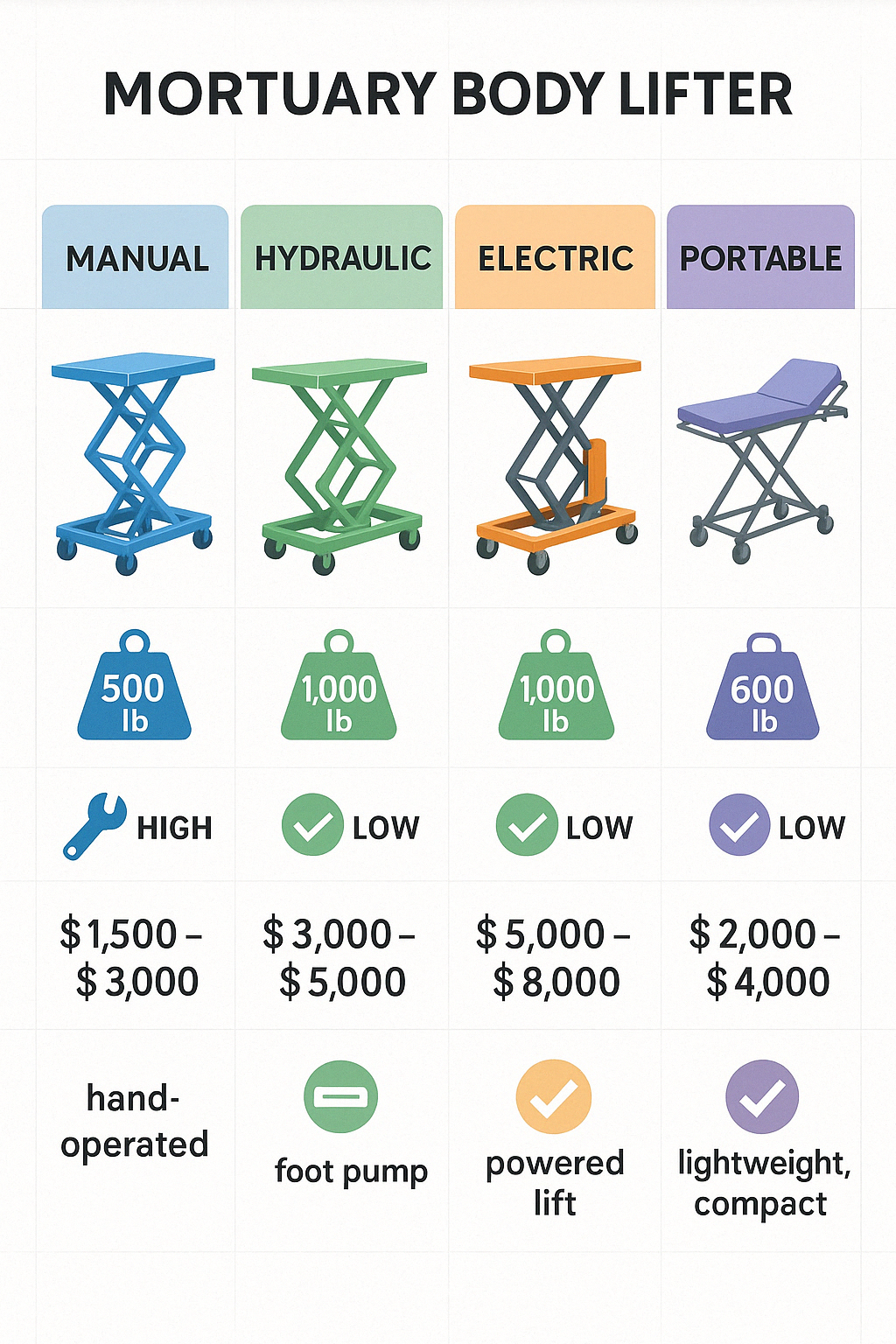
Related content about body lifter mortuary:
Essential Functions of Body Lifters in Mortuaries
Walk into any modern funeral home today, and you'll likely find a body lifter mortuary system quietly revolutionizing how staff care for the deceased. Having visited funeral homes from the mountains of Johnson City, TN to the busy streets of Los Angeles, I've seen how these tools transform daily operations.
Transferring Bodies Safely and Efficiently
At its core, a mortuary body lifter does exactly what the name suggests – it helps move the deceased with dignity and care. Think about the journey a body takes within a funeral home: from transport vehicle to preparation table, embalming area to dressing station, and finally into a casket. Each transition represents a moment where respectful handling matters most.
Without proper equipment, these transfers become a choreographed dance requiring multiple staff members, often with physical strain and risk. The MOBI Hydraulic Body Casket Lift, which handles up to 1000 pounds, transforms this process into a smooth, controlled operation that a single person can manage safely.
Reducing Physical Strain on Staff
"My back isn't what it used to be," is a common refrain I hear from funeral directors who've spent years in the profession before modern lifting equipment became standard. The physical toll of this profession is real and significant.
Funeral service professionals face unique occupational hazards, with back injuries topping the list. Body lifter mortuary equipment directly addresses this challenge by eliminating manual lifting through mechanical advantage. Whether hydraulic or electric, these systems allow a single person to safely accomplish what previously required several staff members working in careful coordination.
One funeral director in Chicago shared with me that after implementing proper lifting equipment, workplace injuries at their facility decreased by nearly 70%. Beyond the numbers, I noticed the relief in his voice – staff no longer dreaded certain aspects of their important work.
Ensuring Dignity in Handling
Perhaps what moves me most when discussing these tools with funeral professionals is the emphasis on dignity. A body lifter isn't just about practicality; it's about honoring someone's loved one through every step of the care process.
The mechanical precision of quality lifting equipment allows for smooth, gentle movements that maintain the integrity of the body's positioning. There's something profoundly respectful about the careful, controlled way a good lifting system works – it's technology serving humanity at a most vulnerable moment.
As our training specialist who works throughout the Southeast often says, "Providing dignified afterlife care isn't just our job – it's our calling. The right equipment helps us fulfill that calling with greater care and safety."
Improving Operational Efficiency
Time matters in funeral service, not for rushing, but for allowing funeral directors to focus their attention where it's needed most – serving families. In busy metropolitan funeral homes, particularly those in places like New York or Los Angeles, the ability to transfer bodies efficiently means more time for the human elements of funeral service.
What once took 15-20 minutes with manual handling can often be accomplished in 5 minutes or less with a proper body lifter mortuary system. This efficiency extends beyond just time savings – it allows funeral homes to maintain exceptional standards of care even during busy periods or with leaner staffing.
The beauty of modern body lifters is how they blend seamlessly into the background of funeral service – reliable tools that support the important work happening in funeral homes across America every day. They represent that perfect marriage of practical functionality and compassionate purpose that defines the best funeral service equipment.
Types of Body Lifter Mortuary Equipment
When it comes to body lifter mortuary equipment, there's no one-size-fits-all solution. At American Mortuary Coolers, we've helped funeral homes across all regions of the United States select the right equipment based on their specific needs. Let's explore the main categories of body lifters available today.
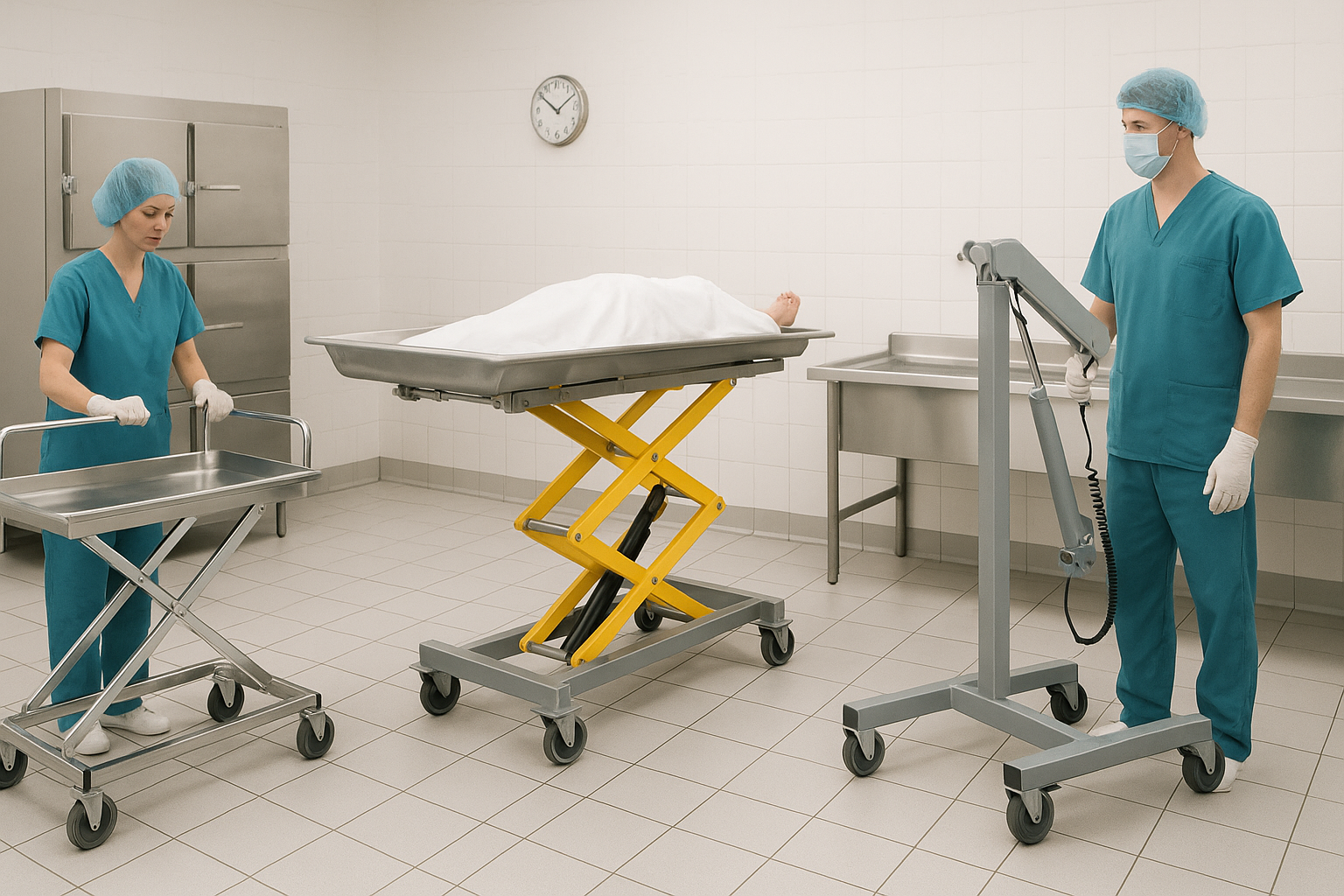
Manual Body Lifter Mortuary Options
Manual body lifters represent the most basic and traditionally used equipment in the mortuary industry. These systems rely on mechanical advantage through levers, cranks, or manual hydraulic pumps to facilitate lifting.
These workhorses of the industry start at a more budget-friendly price point, typically between $1,500-$2,500, making them accessible for smaller operations. One of their biggest advantages? They don't rely on electricity, which can be particularly reassuring during power outages or in rural areas where power reliability might be spotty.
Manual lifters shine in smaller funeral homes with lower case volumes, especially those tucked away in rural parts of Tennessee or throughout the Midwest. Their simpler maintenance requirements mean less downtime and fewer specialized service calls.
As our Midwest representative often tells clients, "Manual systems provide reliability when you need it most. They don't require charging or electrical outlets, making them perfect for certain situations."
While these systems do require more physical effort than their powered cousins, they still dramatically reduce the strain compared to direct manual handling. With weight capacities typically between 300-500 pounds, they handle most standard cases with ease while remaining lighter and more portable than powered alternatives.
Hydraulic Body Lifter Mortuary Solutions
Hydraulic body lifters have become the gold standard in modern mortuaries, striking that perfect balance between power, control, and value. These systems harness hydraulic pressure to generate impressive lifting power without breaking the bank.
The smooth, controlled lifting motion of hydraulic systems makes them a favorite among funeral professionals who prioritize dignity in handling. With capacities typically reaching up to 1000 pounds, they easily accommodate bariatric cases that would overwhelm manual systems.
Take the Heavy Duty Hydraulic Body/Casket Lift, for example. With nine 4-inch swivel casters, it glides through tight doorways with surprising grace. The adjustable body carriage and four washable nylon web straps adapt to different body sizes, making each transfer feel personalized and respectful.
One feature our clients particularly love is the innovative wand system found on quality hydraulic lifters. This clever design automatically guides straps under the body, eliminating one of the most awkward and challenging aspects of transfers.
These systems do require regular maintenance checks of hydraulic fluid levels, but this small effort pays off in reliable performance. They're particularly valuable for medium to large funeral homes in places like Dallas or Atlanta that regularly handle diverse caseloads including bariatric cases.
Electric Body Lifter Mortuary Innovations
At the cutting edge of mortuary lifting technology, electric body lifters represent the pinnacle of convenience and operator comfort. With push-button operation, these sophisticated systems transform what was once a physically demanding task into something almost effortless.
Yes, they come with a higher initial investment—typically $4,000-$7,000 or more—but many funeral directors find the benefits well worth the cost. The precise control over lifting speed and positioning allows for gentle, dignified transfers that honor the deceased and reassure families.
Advanced safety features like automatic shutoffs provide peace of mind, while some premium models even offer programmable height settings that remember your preferences. The silent, smooth operation improves the overall atmosphere during this sensitive time.
The Stepper™ electric stair climbing system deserves special mention as an innovative solution to a common challenge. With a 375-pound capacity and specially designed portable system, it safely steers stairs—a feature particularly valuable for removal services that face unpredictable home configurations.
Electric lifters truly shine in high-volume urban funeral homes in cities like Chicago, New York, or Los Angeles. As our Los Angeles representative puts it, "Electric systems allow a single staff member to manage transfers that would otherwise require multiple people, all while maintaining perfect control and dignity in the process."
Whether you're considering cost, convenience, or capacity, there's a body lifter mortuary solution perfectly suited to your funeral home's unique needs. The right equipment doesn't just make your staff's job easier—it lifts the level of care you provide to families during their most difficult moments.
Key Features to Consider When Choosing a Mortuary Body Lifter
Selecting the right body lifter mortuary equipment isn't just about finding something that lifts—it's about finding the perfect partner for your funeral home's daily operations. At American Mortuary Coolers, we've helped countless funeral directors across the country find their ideal match, from cozy family-owned homes in small Tennessee towns to busy metropolitan facilities in Los Angeles.
Weight Capacity
Let's talk about the elephant in the room first—how much weight can your lifter handle? Standard models typically support up to 500 pounds, but our heavy-duty options can manage an impressive 1000 pounds or more.
When we work with funeral homes in Dallas or Chicago, we often remind them to consider their community demographics. The truth is, Americans are getting larger, and what was once considered an "exceptional" case is becoming more common.
"I always tell folks to buy for tomorrow, not just today," says our Southwest specialist. "If you're on the fence between two capacity ratings, go with the higher one. You'll never regret having extra capacity, but you'll certainly regret not having enough when you need it."
Adjustability and Versatility
Bodies come in all shapes and sizes—shouldn't your lifter accommodate them all with dignity? The best body lifter mortuary equipment offers adjustability in multiple dimensions.
Look for models with adjustable shoulder width settings (both fixed positions and infinitely adjustable options are valuable), ankle width customization, and balance point adjustments. The Mortuary Body Hoist exemplifies thoughtful design with its adjustable head support and four 8-foot lifting straps that function similar to vehicle seat belts—providing secure support regardless of body dimensions.
When a funeral director from Pittsburgh called us looking for equipment that would work for both their petite and larger clients, we helped them find a solution with the versatility they needed. "It's like having multiple pieces of equipment in one," they told us later. "Worth every penny."
Maneuverability and Space Considerations
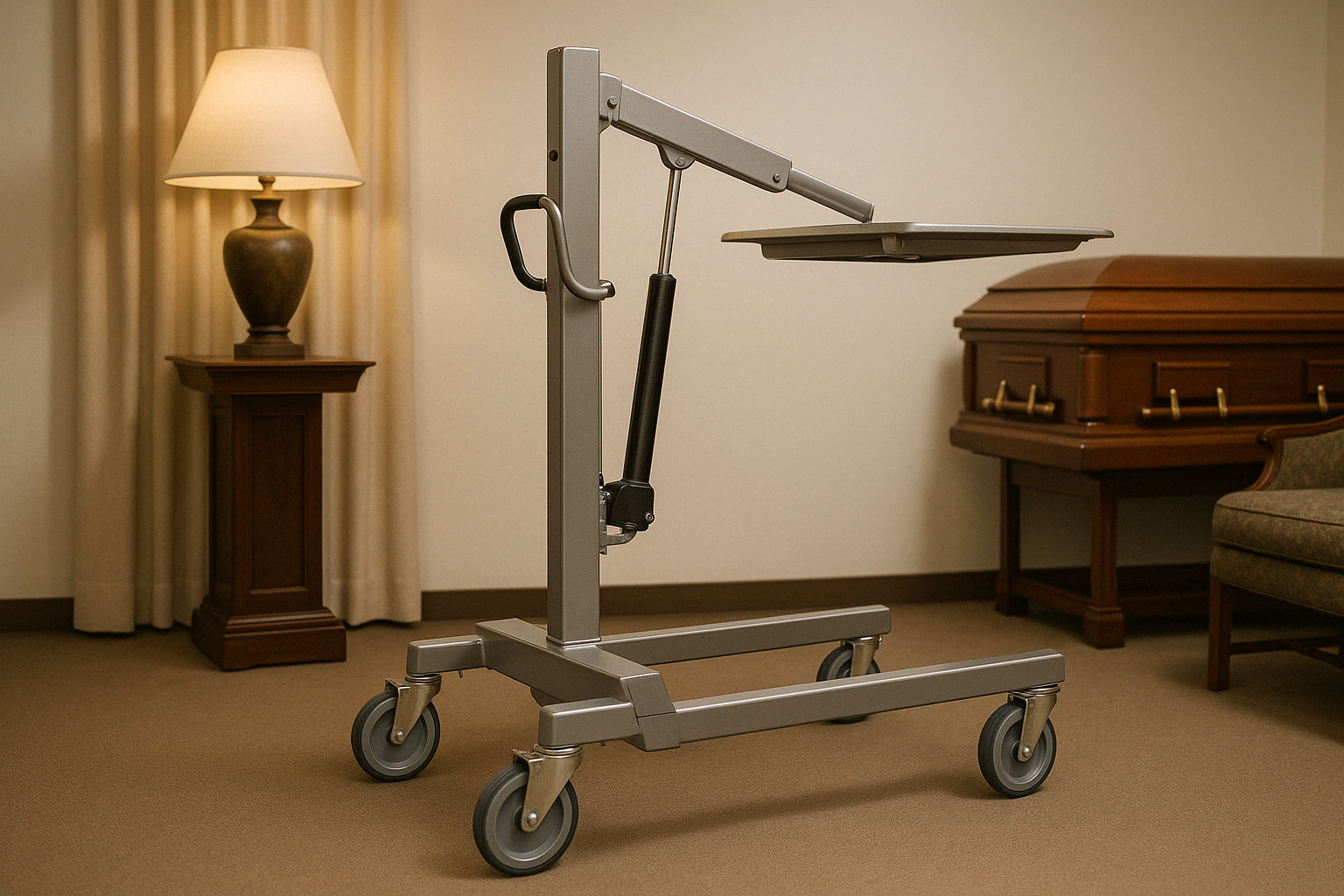
Mortuary spaces aren't exactly known for their spaciousness, are they? That's why maneuverability matters so much. A good lifter needs to steer tight corners, narrow doorways, and crowded prep rooms with grace.
The Heavy Duty Hydraulic Body/Casket Lift features nine 4-inch swivel casters that make it surprisingly nimble for such a substantial piece of equipment. For smaller facilities, consider foldable designs like the Mortuary Body Hoist that can be tucked against a wall when not in use.
"In my 30 years of funeral service, I've worked in everything from sprawling modern facilities to historic homes converted to funeral parlors," shares our Northeast representative. "The one constant is that you never have quite enough space. Equipment that can steer tight spots or fold away is worth its weight in gold."
Safety Features
Safety isn't optional—it's essential for protecting both your staff and the dignity of those in your care. Look for locking mechanisms that prevent accidental lowering, stable base designs to prevent tipping, and smooth, controlled movement capabilities.
On electric models, emergency stop functions provide an extra layer of security. Even simple features like non-slip grips and handles can make a significant difference in daily use.
Our training coordinator puts it perfectly: "A sudden shift during transfer isn't just physically dangerous—it's emotionally distressing for staff who take pride in providing dignified care. Good safety features prevent those moments from happening."
Compatibility with Other Equipment
The best body lifter mortuary equipment doesn't exist in isolation—it works harmoniously with your preparation tables, caskets, and refrigeration units. Think of it as part of an ecosystem rather than a standalone tool.
When considering compatibility, check height ranges to ensure alignment with your preparation tables, verify the lifter can position precisely over caskets, and confirm it has adequate clearance to work with your mortuary coolers.
At American Mortuary Coolers, we specialize in creating custom solutions where everything works together seamlessly. Our track systems can transform your prep room operations, offering flexibility that goes beyond what standard stationary mounts can provide.
Maintenance Requirements
The initial purchase is just the beginning of your relationship with your body lifter. Long-term reliability depends on both initial quality and ongoing maintenance needs.
When evaluating options, consider how frequently maintenance will be required, how easily you can obtain replacement parts, and the complexity of routine maintenance procedures. The Mortuary Body Hoist comes with a 5-Year Limited Warranty on Parts—the kind of commitment that speaks volumes about expected durability.
"The best equipment," as our Tennessee workshop manager likes to say, "is the kind you almost forget about because it just works, day in and day out, without drama."
Staff Training Needs
Even the most impressive body lifter is only as effective as the people operating it. Consider how intuitive the operation is and what training will be required to bring your team up to speed.
Look for manufacturers who provide comprehensive training resources, clear documentation, and ongoing support. At American Mortuary Coolers, we believe equipment delivery is just the beginning of our relationship with clients. We ensure your team knows exactly how to operate your new equipment safely and efficiently from day one.
"I've seen $10,000 pieces of equipment gathering dust because staff weren't comfortable using them," notes our training specialist. "The best investment includes making sure everyone feels confident with the new technology."
More info about Mortuary Hoist Lift Systems
Maintenance and Staff Training for Body Lifters
Keeping your body lifter mortuary equipment in tip-top shape isn't just about protecting your investment—it's about ensuring the dignity of those in your care and the safety of your staff. At American Mortuary Coolers, we've learned a thing or two about maintenance from our partners across the country, from busy urban funeral homes in New York to family-owned establishments in rural Tennessee.
Preventative Maintenance Schedule
Think of your body lifter like your car—regular check-ups prevent breakdowns at the worst possible moments. Most funeral directors we work with incorporate quick daily visual inspections into their closing routines. This means taking a minute to look over straps and cables, make sure wheels roll smoothly, and check that all locking mechanisms click into place properly.
"I've made it a habit to wipe down our lifter every evening and give it a quick once-over," shares a funeral director from our Nashville service area. "It takes maybe two minutes, but it's caught several minor issues before they became major problems."
Monthly maintenance goes a step deeper. Set aside time to thoroughly clean all surfaces, add lubricant to moving parts (following manufacturer guidelines), and check hydraulic fluid levels if your model uses hydraulics. For electric models, this is also the time to verify all electronic components are functioning correctly.
Quarterly and annual maintenance should be more comprehensive. At these intervals, trained personnel should test the equipment under maximum load, replace any worn components, and for hydraulic systems, check for leaks or air in the lines. Many of our clients find that scheduling professional service visits annually helps extend their equipment's lifespan significantly.
Cleaning and Disinfection Protocols
In the mortuary environment, proper cleaning isn't just about appearances—it's a matter of health and safety. Body lifter mortuary equipment requires special attention since it comes into contact with bodily fluids and preparation chemicals.
The best approach starts with removing visible debris using disposable towels, followed by application of an appropriate EPA-registered disinfectant. Allow the disinfectant to sit for the manufacturer-recommended contact time—this is where many cleaning routines fall short. Rushing this step reduces effectiveness.
After disinfection, wipe down with clean water to remove chemical residue that could potentially damage components over time. Pay special attention to thoroughly drying fabric elements like straps, as moisture can lead to premature deterioration.
"We learned the hard way that some disinfectants can damage hydraulic seals," notes our service manager who covers the Southeast region. "Always keep disinfectant solutions away from hydraulic components, and apply appropriate lubricants after cleaning to maintain smooth operation."
Troubleshooting Common Issues
Even with diligent maintenance, occasional issues arise. Knowing how to identify and address common problems can save you time and frustration.
For hydraulic lifters, slow lifting usually indicates low fluid levels or air in the system—both relatively simple fixes. Fluid leaks, however, require immediate attention to prevent failure and potential accidents. Uneven lifting might signal cylinder problems or improper load distribution.
Electric systems have their own set of typical issues. Battery performance problems often stem from improper charging practices—many batteries last longer when fully discharged before recharging. Control malfunctions frequently resolve with a simple electronics reset, while unusual noises from the motor or gears typically warrant professional inspection.
Across all types of lifters, wheel and caster problems are among the most common complaints. Regular lubrication and occasional replacement keep your equipment rolling smoothly. Strap wear should never be ignored—replace straps at the first signs of fraying to prevent catastrophic failures.
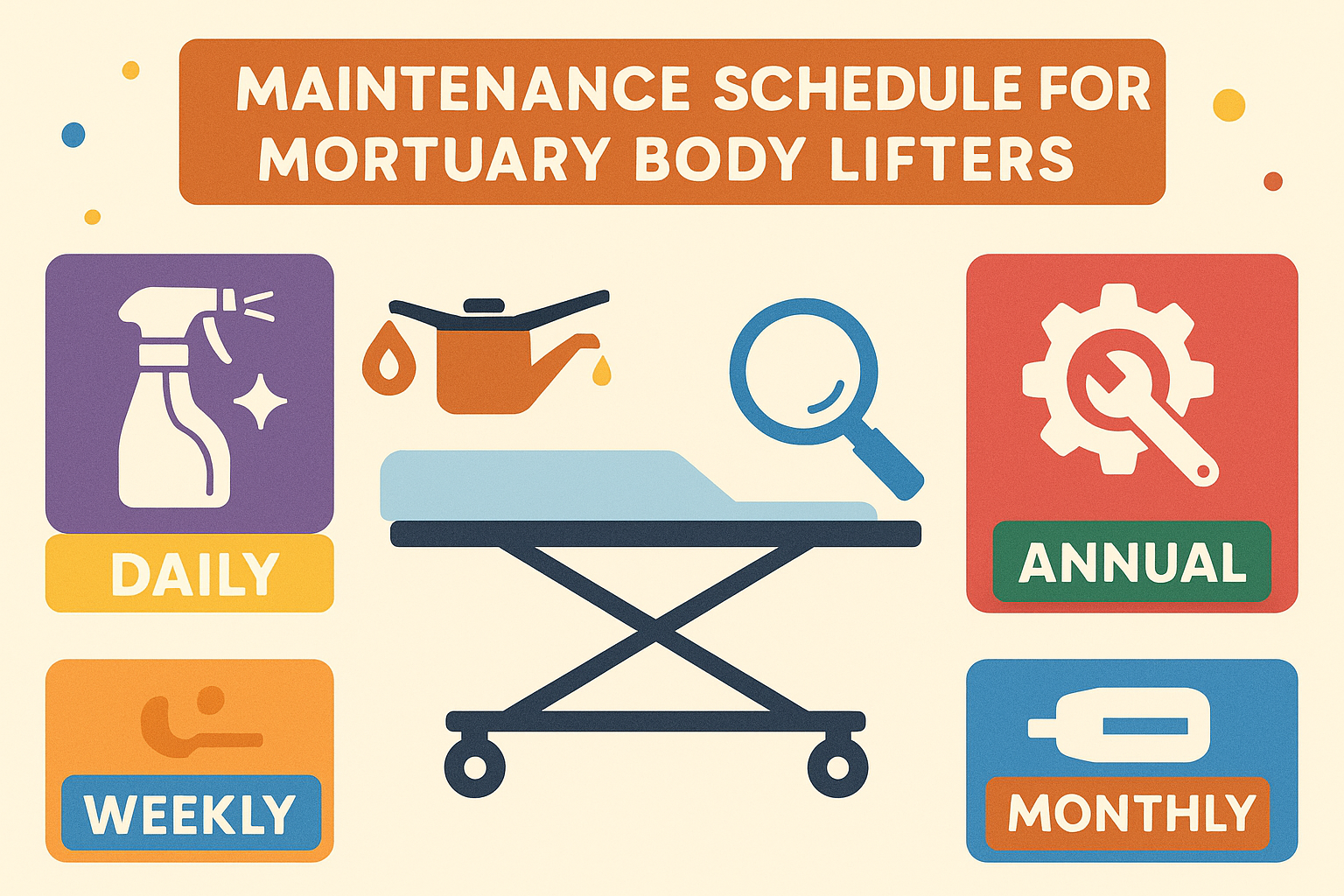
Comprehensive Staff Training
A top-quality body lifter mortuary system is only as good as the people operating it. Comprehensive training ensures your equipment performs safely and effectively while maximizing its lifespan.
Basic operation training should cover step-by-step procedures, weight capacity limitations, proper positioning techniques, and emergency stop procedures. This foundation ensures safe daily operation.
"The most common mistake we see is improper weight distribution," explains our training specialist who travels between our regional offices. "Even well within the overall weight capacity, unbalanced loads put stress on components and create unsafe conditions. We emphasize proper balance techniques in all our training sessions."
Advanced handling techniques become particularly important when managing challenging cases. This includes safely transferring larger individuals, navigating tight spaces in older facilities, and executing smooth transfers between different surfaces. Many funeral homes develop specific protocols for different scenarios—table to casket, vehicle to table—to ensure consistency.
Safety training should cover response to equipment malfunctions, manual override procedures when applicable, and proper incident reporting. We recommend annual certification and refresher training for all staff who operate lifting equipment.
Documentation and Compliance
Keeping thorough records protects your business and helps track equipment performance over time. Maintain logs of all maintenance activities, staff training sessions, and any incidents involving the equipment.
In regions with specific regulatory requirements, such as California or New York, additional documentation demonstrates compliance with state standards. These records also prove invaluable should warranty claims arise.
"Documentation isn't the fun part of the job," admits a funeral director from our Western service region, "but it's saved us countless times—both when training new staff and when demonstrating our compliance during inspections."
At American Mortuary Coolers, we understand that maintaining your equipment properly extends its life and ensures it's ready when you need it most. That's why we provide comprehensive training programs with all equipment we supply, custom to your specific facility layout and team needs. Our regional specialists can conduct on-site training sessions and help establish maintenance routines that work for your unique operation.
More info about Mortuary Hoist Lift Systems
Latest Technological Advancements in Body Lifter Design
The world of body lifter mortuary equipment has undergone remarkable change in recent years. At American Mortuary Coolers, we're passionate about staying ahead of these innovations to bring funeral homes across the country—from small-town Tennessee to busy Los Angeles—the most advanced solutions available. Let's explore how technology is reshaping this essential equipment and making daily operations more dignified, safer, and efficient.
Integrated Digital Weight Sensing
Remember the days of guessing whether a lift could handle a particular case? Those days are thankfully behind us. Today's premium body lifter mortuary systems now feature sophisticated digital weight sensing technology that takes the guesswork out of the equation.
These smart systems display real-time weight readings as you operate the lift, with visual and audible alerts that warn when you're approaching capacity limits. For funeral directors handling diverse caseloads, this provides tremendous peace of mind. Many models even record this data, creating valuable records for quality assurance and training purposes.
"The digital weight display was a game-changer for our team," shares a funeral director from our Chicago clientele. "No more wondering if we're within safe limits—we know exactly what we're working with, which makes everyone more confident."
Motorized Positioning Systems
Beyond simply lifting up and down, today's advanced systems offer remarkable precision in body positioning. The latest body lifter mortuary equipment features motorized positioning that gives operators unprecedented control.
The Powered Scissor Lift System HD 1000 MAX with Multi-Directional Top exemplifies this technology. With programmable height settings, you can ensure consistent transfers to your standard tables and caskets with the touch of a button. Some models even offer tilting capabilities that facilitate fluid drainage during embalming—a feature that dramatically improves workflow efficiency.
What's particularly impressive is how these systems can be operated via remote control, allowing a single staff member to perfectly position the deceased while maintaining a clear view from any angle. This is especially valuable in smaller preparation rooms where space is at a premium.
Electric Stair Climbing Technology
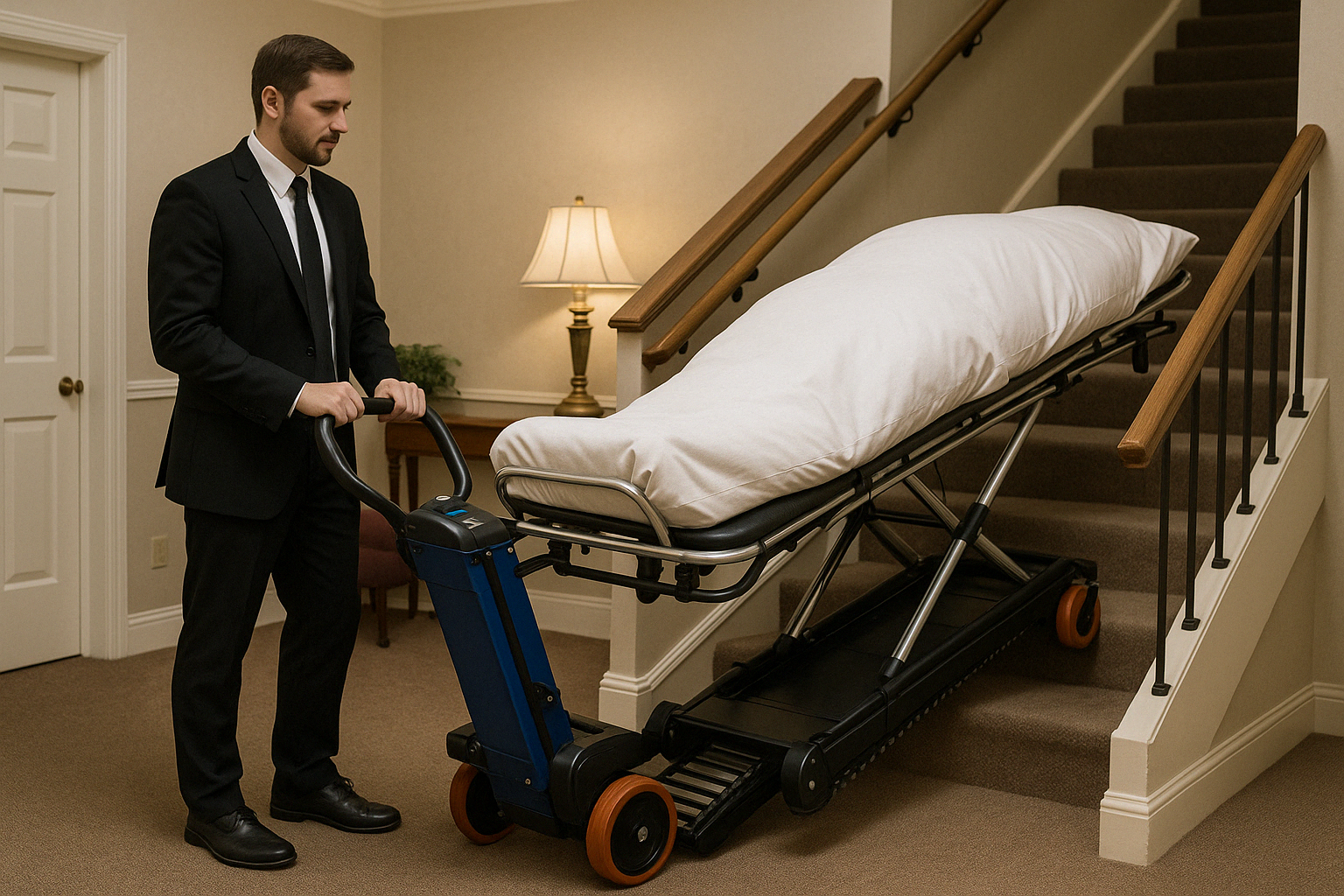
If you've ever been part of a removal team navigating a narrow staircase while carrying a decedent, you'll appreciate this innovation immediately. The development of specialized stair climbing systems specifically designed for mortuary applications represents one of the most significant breakthroughs in recent years.
The Stepper™ electric stair climbing system has transformed what was traditionally the most physically demanding aspect of funeral service. With a 375 lbs capacity, this ingenious system allows a single operator to safely steer stairs during removals.
A removal specialist from our Dallas clientele puts it perfectly: "What used to be a four-person job with significant injury risk is now manageable by just one or two of us. The Stepper has saved our backs and improved our service, especially in older homes with narrow, winding staircases."
Advanced Materials and Construction
Today's body lifter mortuary equipment features construction materials that would have seemed like science fiction just a decade ago. Aircraft-grade aluminum components provide exceptional strength while keeping the equipment lightweight and maneuverable. Medical-grade stainless steel offers unparalleled durability and simplified infection control.
Perhaps most impressive are the specialized antimicrobial surface treatments now available on premium models. These surfaces actively resist bacterial growth, reducing cross-contamination risks in the preparation room environment where exposure to various fluids is unavoidable.
"The newer materials aren't just stronger—they're smarter," explains our equipment specialist. "They resist corrosion from embalming chemicals, clean up more easily, and stand up to years of daily use without degradation."
Wireless Remote Operation
Freedom of movement makes all the difference in the preparation room. The latest generation of electric body lifter mortuary equipment often features wireless remote control capabilities, allowing funeral professionals to position themselves optimally while maintaining precise control.
Take the Tug-Along Casket & Gurney Winch with wireless remote control as an example. With an impressive 1000 lbs capacity, this system lets a single operator manage the entire transfer process with perfect visibility from any angle. This technology is particularly valuable in smaller preparation rooms where space constraints might otherwise make positioning challenging.
The wireless functionality also means fewer cords to clean and maintain—a small but meaningful improvement in busy preparation rooms.
Integration with Track and Gantry Systems
The most sophisticated mortuary operations are now implementing comprehensive lifting solutions that integrate with ceiling-mounted track and gantry systems. This creates a complete transfer solution throughout the preparation area, eliminating many traditional lifting episodes.
Our customized track systems at American Mortuary Coolers offer remarkable versatility for prep rooms of all sizes. Rather than forcing your workflow to adapt to standard equipment, these systems can be custom to your specific facility layout—whether you're working in a historic funeral home with architectural constraints or a modern purpose-built facility.
The benefits extend beyond convenience—these integrated systems dramatically reduce staff strain by eliminating the need to repeatedly lift and transfer the deceased between different stations. One continuous system means smoother operations and significantly reduced injury risk.
Smart Technology and IoT Integration
While still emerging in the mortuary sector, smart technology and Internet of Things (IoT) integration represent the newest frontier in body lifter mortuary equipment.
Forward-thinking manufacturers are now incorporating predictive maintenance alerts based on usage patterns, helping funeral homes address potential issues before they cause downtime. Remote diagnostics capabilities allow service technicians to troubleshoot problems efficiently, sometimes without even visiting your location.
"We're just beginning to see the potential of connected mortuary equipment," notes our innovation specialist. "Imagine systems that automatically schedule their own maintenance, order replacement parts before you know you need them, or optimize their operations based on your specific usage patterns."
Bariatric-Specific Innovations
With bariatric cases becoming increasingly common across the country, manufacturers have responded with thoughtful innovations specifically addressing these unique challenges.
Modern body lifter mortuary equipment designed for bariatric cases goes far beyond simply increasing weight capacity. These specialized systems feature wider support surfaces, multiple lifting points for balanced weight distribution, and reinforced components throughout the lifting mechanism.
What's particularly impressive are the specialized strapping systems that ensure secure, dignified handling regardless of body size or shape. These innovations reflect our industry's commitment to providing the same level of respectful care to every individual who comes into our care.
"The best bariatric equipment doesn't just handle more weight—it maintains dignity throughout the process," explains our specialist from the Pacific Region. "That's what families deserve, regardless of their loved one's size."
Latest research on mortuary equipment advancements
Frequently Asked Questions about Body Lifters in Mortuaries
Over the years of working with funeral homes from Johnson City to Los Angeles, we've gathered quite a collection of questions about body lifter mortuary equipment. I'd like to share thoughtful answers to the questions we hear most often.
How do body lifters improve safety and efficiency in funeral homes?
The impact of a good body lifter on your funeral home's operations can be truly transformative. On the safety front, these specialized tools eliminate the need for manual lifting—a leading cause of back injuries among funeral professionals. The stable lifting platforms prevent those heart-stopping moments when a transfer might go wrong, while properly distributing weight to protect your staff from strain.
One funeral director in Chicago told me something I'll never forget: "After getting our hydraulic lifter, we cut transfer times by nearly two-thirds while completely eliminating staff injuries. It paid for itself within six months."
The efficiency improvements are equally impressive. Tasks that once required three or four staff members can often be handled by just one person. This means your team experiences less physical fatigue throughout the day, allowing them to maintain their compassionate focus when interacting with families. The ripple effects of this efficiency touch every aspect of your operation.
What are the key features to look for when selecting a body lifter for mortuary use?
Choosing the right body lifter mortuary equipment requires attention to several critical features.
First, consider the weight capacity you'll need. I generally recommend systems rated for 600-1000 pounds to provide a comfortable safety margin, especially as bariatric cases become more common.
Adjustability is non-negotiable—look for systems like the BodyHoist with both fixed and step-less shoulder width adjustments to accommodate different body types with dignity.
Don't overlook maneuverability. Those nine 4-inch swivel casters on our Heavy Duty Hydraulic Body/Casket Lift make a world of difference when navigating tight corners or doorways in older funeral homes.
The lifting mechanism you choose—whether manual, hydraulic, or electric—should align with your case volume and staff capabilities. Busier facilities typically find hydraulic or electric systems well worth the investment.
Durability matters in the challenging mortuary environment. Look for stainless steel construction and medical-grade components that can withstand repeated exposure to fluids and chemicals.
Finally, consider the warranty and service availability. A quality manufacturer should stand behind their equipment with at least a 5-year warranty on major components, and offer responsive service when you need it.
How important is staff training in the use of body lifters?
I can't emphasize this enough: proper training makes all the difference in the world. Even the most advanced body lifter mortuary equipment requires knowledgeable operators to deliver its full benefits.
Well-trained staff move with a confidence and precision that's immediately apparent. They understand weight limitations, positioning techniques, and emergency procedures. This knowledge translates directly into safer operations and longer equipment life.
But beyond the practical benefits, there's something more profound at stake. Proper training ensures your staff can maintain the dignity of the deceased throughout every transfer. Those smooth, controlled movements demonstrate respect for both the departed and their families—something that's at the heart of what we do in this profession.
At American Mortuary Coolers, we include comprehensive training with every equipment purchase. Our regional specialists come to your facility to provide hands-on instruction custom to your specific setup and needs. We've found this personalized approach helps your team build both skill and confidence.
What maintenance is required for body lifters to ensure longevity and reliability?
Taking good care of your body lifter mortuary equipment pays dividends in reliability and longevity. The specific maintenance needs vary by lifter type, but all require regular attention.
For manual lifters, you'll want to lubricate moving parts monthly, inspect straps and connection points weekly, and tighten fasteners regularly. Hydraulic systems need all this plus fluid checks monthly and complete fluid replacement annually. Electric systems require proper battery maintenance and periodic inspection of electrical components.
All systems benefit from thorough cleaning after each use—something particularly important in our industry where exposure to various fluids is unavoidable.
"Preventative maintenance is always less expensive and less disruptive than emergency repairs," as our service manager likes to say. This is especially true in funeral service, where equipment failure at a critical moment can create significant challenges.
We recommend keeping detailed maintenance logs and scheduling professional inspections annually. This approach helps catch small issues before they become major problems that could interrupt your service to families.
How do different types of body lifters (manual, hydraulic, electric) compare in terms of cost?
When considering the investment in body lifter mortuary equipment, it's helpful to understand the cost differences between types.
Manual lifters represent the most accessible entry point, typically ranging from $1,500-$3,500. They're simple to maintain and have no direct operational costs, though they do require more physical effort from your staff.
Hydraulic systems occupy the middle ground at $3,000-$6,000. Their maintenance costs are moderate, primarily involving hydraulic fluid replacement and mechanical servicing. The smooth operation they provide often justifies the higher initial investment.
Electric lifters sit at the premium end, starting around $5,000 and ranging upward of $10,000 for advanced models. While they have higher maintenance costs including battery replacement every few years, they offer best ease of use.
Specialized systems like stair climbers represent the highest investment at $7,000-$15,000, but they solve very specific challenges that can otherwise require multiple staff members.
I always encourage funeral directors to look beyond the initial price tag to consider the total value. A hydraulic or electric system might cost more upfront but could save you significantly through reduced staffing needs, fewer workplace injuries, and improved operational efficiency. Many funeral homes find these systems pay for themselves within a year or two of regular use.
To help make these investments more accessible, we offer financing options with 0% down payment requirements, allowing you to access the equipment that best serves your needs regardless of initial budget constraints.
Lift Your Service: Hydraulic Body Lifts and Stretchers
Conclusion
Selecting the right body lifter mortuary equipment represents a critical decision for funeral homes and mortuaries committed to operational excellence, staff safety, and dignified care. Throughout this comprehensive review, we've explored the essential functions, diverse types, key features, maintenance requirements, and technological advancements that define modern mortuary lifting solutions.
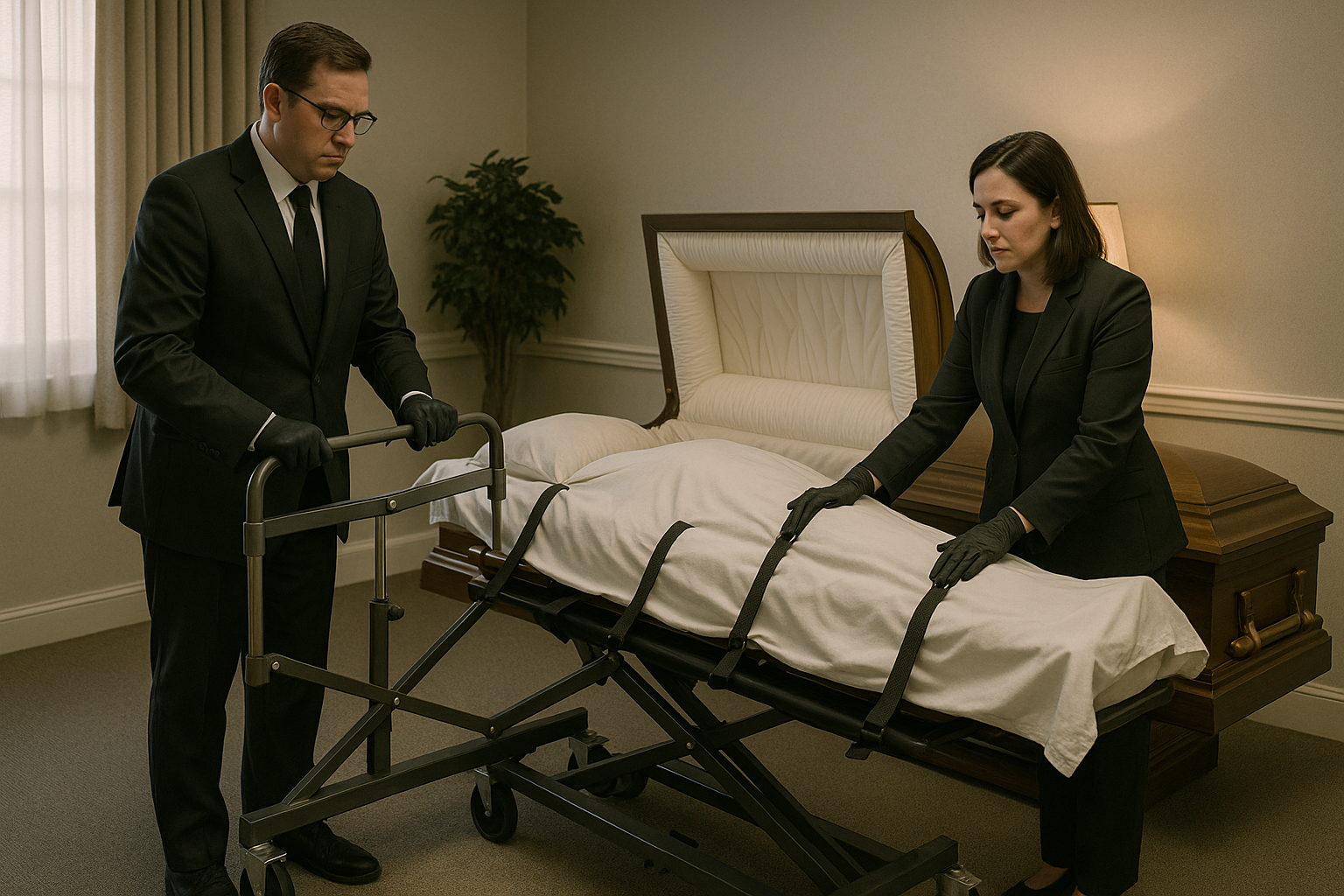
The journey of body lifters from simple manual devices to today's sophisticated hydraulic and electric systems mirrors our industry's dedication to improving both working conditions and the quality of care we provide. It's remarkable to see how far we've come – from basic manual lifts to the Heavy-Duty Hydraulic Body/Casket Lift with its impressive 1000 lbs capacity, or the game-changing Stepper™ electric stair climbing system that transforms one of the most challenging aspects of our work.
At American Mortuary Coolers, we've walked alongside funeral directors from coast to coast, and we understand that every funeral home has its own unique story and needs. The equipment that perfectly serves a busy urban facility in Chicago might not be ideal for a family-owned home in rural Tennessee. That's why we don't believe in one-size-fits-all solutions – we take the time to understand your specific requirements, facility layout, case volume, and the community you serve.
We've seen how the right lifting equipment transforms entire operations. When a funeral director calls us months after an installation to share that their staff's chronic back pain has disappeared, or that they've been able to handle difficult removals with half the personnel – those are the moments that remind us why this equipment matters so much.
Beyond just preventing injuries, quality body lifter mortuary equipment improves your entire workflow. It ensures that every deceased person in your care receives the same dignified, careful handling regardless of their size or the circumstances of their passing. In our eyes, this consistent dignity is perhaps the most important benefit of all.
Our commitment to you extends far beyond the delivery date. When you work with American Mortuary Coolers, you're gaining a long-term partner who provides comprehensive staff training, responsive maintenance support, and ongoing consultation. With service centers strategically positioned across the contiguous 48 states, we're never far away when you need us.
As funeral service continues to evolve, with growing emphasis on both staff wellbeing and exceptional family experiences, investing in quality lifting equipment becomes more than just a practical decision – it's a statement about your facility's values and standards of care.
We'd love to hear about your unique needs and help you find how our custom solutions can lift your mortuary operations. Whether you're upgrading existing equipment or outfitting a new facility, our team will guide you through finding the perfect fit – not just for today, but for years of reliable service ahead.

